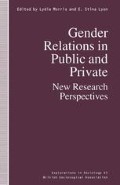Abstract
Over the last two decades, American workers have increasingly divided into a majority who work too many hours and a minority with no work at all. This split hurts families at both extremes, but I focus here on the growing scarcity of time among the long-hours majority. For many of them, a speed-up at the office and factory has marginalised life at home, so that the very term ‘work—family balance’ seems to them a bland slogan with little bearing on real life. In this chapter, I describe the speed-up and review a range of cultural responses to it, including ‘family-friendly reforms’ such as flextime, job sharing, part time work and parental leave. Why, I ask, do people not resist the speed-up more than they do? When offered these reforms, why don’t more take advantage of them? Drawing upon my on-going research in an American Fortune 500 company, I argue that a company’s ‘family-friendly’ policy goes only as deep as the ‘emotional geography’ of the workplace and home, the drawn and redrawn boundaries between the sacred and the profane. I show how ways of talking about time (for example, separating ‘quality’ from ‘quantity’ time) become code words to describe that emotional geography.
Access this chapter
Tax calculation will be finalised at checkout
Purchases are for personal use only
Preview
Unable to display preview. Download preview PDF.
References
Alvesson, Mats and Berg, Per Olof (1992), Corporate Culture and Organizational Symbolism: An Overview Berlin (New York: Walter de Gruyter).
Bailyn, Lotte (1993), Breaking the Mold: Women, Men and Time in the New Corporate World (New York: Free Press).
Blyton, Paul (1985), Changes in Working Time: An International Review (New York: St Martin’s Press).
Bowen, Gary L. and Orthner, Dennis K. (1991), ‘Effects of Organizational Culture on Fatherhood’, in F. W. Bozett and S. M. H. Hanson (eds), Fatherhood and Families in Cultural Context (New York: Springer).
Coolsen, P., Seligson, M. and Garbino J. (1986), When School’s Out and Nobody’s Home (Chicago, IL: National Committee for the Prevention of Child Abuse).
Duncombe, Jean and Marsden, Dennis (1993), ‘Workaholics and Whining Women, Theorizing Intimacy and Emotion Work: The Last Frontier of Gender Inequality?’, unpublished paper, Department of Sociology, University of Essex, England.
Engelstad, Fredrik (1993), ‘Family Structure and Institutional Interplay’, in Leira, Annlang (ed.), Family Sociology — Developing the Field (Oslo: Institut fur Samfunnsforskning), pp. 72–90.
Fineman, Steven (ed.) (1993), Emotion in Organizations (London: Sage Publishers).
Friedman, D. (1991), Linking Work—Family Issues to the Bottom Line (New York: Conference Board). (Dana Friedman is co-president of the Families and Work Institute, New York).
Fuchs, V. (1991), ‘Are Americans Under-investing in their Children?’, Society, Sept/Oct, pp. 14–22.
Galinsky, Ellen, Friedman, Dana E. and Hernandez, Carol A. (1991), The Corporate Reference Guide to Work Family Programs (New York: Families and Work Institute).
Galinsky, Ellen, Bond, James and Friedman, Dana (1993), The Changing Workforce: Highlights of the National Study (New York: Family and Work Institute).
Giddens, Anthony (1976), New Rules of Sociological Method (New York: Basic Books).
Giddens, Anthony (1991), Modernity and Self-Identity (Stanford, CA: Stanford University Press).
Hareven, T. K. (1982), Family Time and Industrial Time (Cambridge: Cambridge University Press).
Hewlett, Sylvia Ann (1991), When the Bough Breaks: The Cost of Neglecting Our Children (New York: Basic Books).
Hochschild, Arlie (1983), The Managed Heart: The Commercialization of Human Feeling (Berkeley, CA: University of California Press).
Hochschild, Arlie (1994), ‘The Commercial Spirit of Intimate Life and the Abduction of Feminism: Signs from Women’s Advice Books’, Theory, Culture & Society, vol. II (May), pp. 1–24.
Hochschild, Arlie with Anne Machung (1989), The Second Shift: Working Parents and the Revolution at Home (New York: Viking Press).
Hofstede, Geertz (1980), Culture’s Consequences, International Differences in Work-Related Values (London: Sage Publishers).
Kanter, Rosabeth Moss (1977), Work and Family in the United States: A Critical Review and Agenda for Research and Policy (New York: Russell Sage Foundation).
Kanter, Rosabeth Moss (1983), The Change Masters (New York: Simon & Schuster).
Lasch, Christopher (1977), Haven in a Heartless World (New York: Basic Books).
Martin, Joanne (1992), Cultures in Organizations: Three Perspectives (New York: Oxford University Press).
McCarthy, Eugene and McGaughey, William (1981), Nonfinancial Economics: The Case for Shorter Hours of Work (New York: Praeger).
Negrey, Cynthia (1993), Gender, Time and Reduced Work (New York: SUNY Press).
Owen, John (1989), Reduced Working Hours: Cure for Unemployment or Economic Burden? (Baltimore, MD: Johns Hopkins Press).
Popenoe, David (1989), Disturbing the Nest: Family Change and Decline in Modern Societies (New York: Aldine De Gruyter).
Schaevitz, Marjorie Hansen (1984), The Superwoman Syndrome (New York: Warner Books).
Schor, Juliet B. (1992), The Overworked American: The Unexpected Decline of Leisure (New York: Basic Books).
Schwartz, Felice N. (1989), ‘Management Women and the New Facts of Life’, Harvard Business Review, 1, January—February, pp. 65–76.
Skolnick, Arlene (1991), Embattled Paradise (New York: Basic Books).
Tolstoy, Leo (1966), War and Peace (New York: W. W. Norton).
Trice, Harrison M. and Beyer, Janice M. (1993), The Cultures of Work Organizations (Englewood Cliffs, NJ: Prentice-Hall).
Van Maanen, John and Kunda, Gideon (1989), ‘Real Feelings: Emotional Expression and Organizational Culture’, Research in Organizational Behavior, vol. 11, pp. 43–103.
White, Lynn K. and Riesmann, Agnes (1992), ‘When the Brady Bunch Grows Up: Step-, Half- and Full-Sibling Relationships in Adulthood’, Journal of Marriage and the Family, vol. 54 (February), pp. 197–208.
Zedek, Sheldon, Maslach, Christina, Mosier, Kathleen, and Skitka, Linda (1992), ‘Affective Response to Work and Quality of Family Life: Employee and Spouse Perspectives’, in Goldsmith, Elizabeth (ed.), Work and Family: Theory, Research and Applications (London: Sage Publishers).
Editor information
Editors and Affiliations
Copyright information
© 1996 British Sociological Association
About this chapter
Cite this chapter
Hochschild, A.R. (1996). The Emotional Geography of Work and Family Life. In: Morris, L., Lyon, E.S. (eds) Gender Relations in Public and Private. Explorations in Sociology. Palgrave Macmillan, London. https://doi.org/10.1007/978-1-349-24543-7_2
Download citation
DOI: https://doi.org/10.1007/978-1-349-24543-7_2
Publisher Name: Palgrave Macmillan, London
Print ISBN: 978-0-333-63088-4
Online ISBN: 978-1-349-24543-7
eBook Packages: Palgrave Social & Cultural Studies CollectionSocial Sciences (R0)

